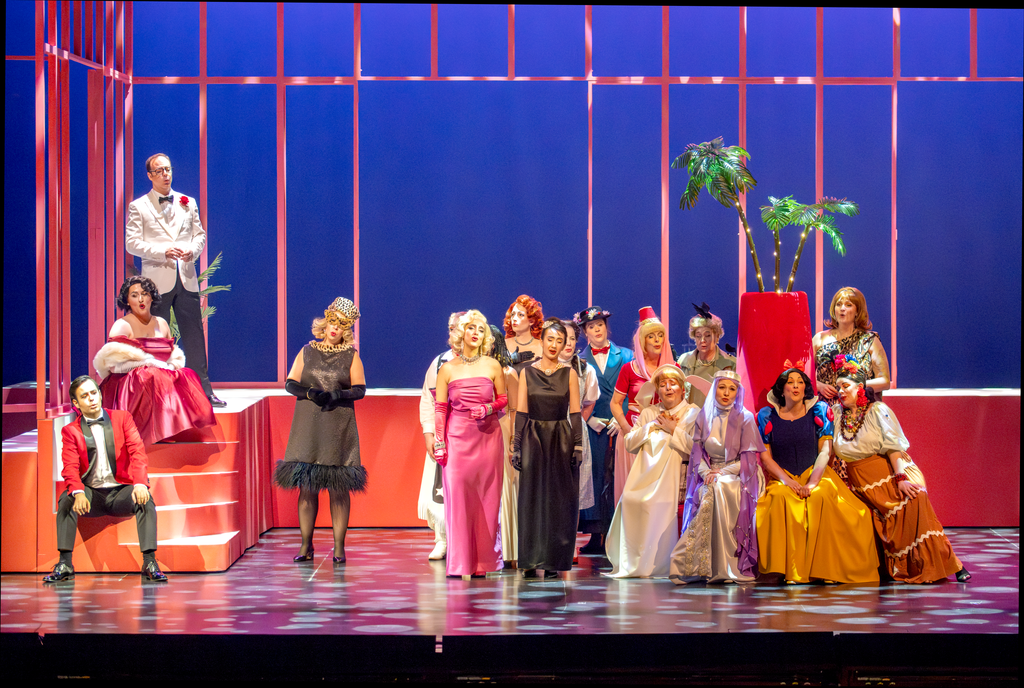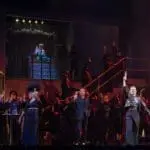Cancelled in 2020 due to the pandemic, Johann Strauss‘ Die Fledermaus was finally performed four times at the Opéra de Québec from May 11 to 18 in an entirely Quebec production, sung and spoken in French in a version inspired by Paul Ferrier‘s (1904).
As the second half of the nineteenth century was marked by universal exhibitions, Bertrand Alain, who in 2002 had directed an original staging of Mozart‘s Don Giovanni, transposed the action of Die Fledermaus to Montreal during Expo 67. The result was colorful, entertaining, and full of Quebecois allusions. And, to spice things up, the Overture ended with a short pantomime reminding the audience of the raison d’être of “the revenge of the bat”, with Doctor Falke, dead drunk, disguised as … Batman!
The three acts evolved in the same very sober setting, designed by Julie Lévesque, with a minimum of accessories, just enough to find your way. As for the costumes, Emily Wahlman has shown creativity, daring to use color and fantasy. As the 2nd act took place during a costume ball, the maid Adele metamorphosed into Marilyn Monroe and Prince Orlofski’s other guests were characters or actors from television series or films of the 1960s: Snow White, Jinny, Mary Poppins, Superman, Zorro, Mr. Spock, Rita Hayworth, etc. Most of these roles went to the choristers, whose excellent work must once again be highlighted.
While giving young singers a chance to make their debut at the Opéra de Québec, the very balanced vocal cast relied on company regulars, such as baritone Dominique Côté, Dominic Veilleux and soprano Jessica Latouche, who had distinguished themselves at the 2023 Opera Festival in the Messe solennelle pour une pleine lune d’été (Michel Tremblay, Christian Thomas), as well as on the tenors Éric Laporte (Alfred) and Hugues Saint-Gelais (Blind), all very comfortable in the many comic or light duets and trios of Strauss’ operetta.
Dominique Côté proved that he had the vocal range to play Eisenstein, a role normally given to a tenor. Jessica Latouche (Rosaline, in the French version) sang with aplomb, in German, the czardas of Act II. Dominic Veilleux well personified Falke, the character who plots revenge, and Éric Laporte was simply hilarious by putting his voice his powerful voice at the service of Rosaline’s lover. A special mention to the baritone Geoffroy Salvas (Frank), solid, vocally and scenically, as a prison director.
The vocal agility of Catherine St-Arnaud (Adèle) was showcased in the famous aria “Pour un marquis” (Mein Herr Marquis) in Act II, and in her duet with Ida, well performed by Rose Lebeau-Sabourin. At their side, the mezzo-soprano Marie-Andrée Mathieu was a sympathetic and delicate Prince Orlofski.
Conductor Nicolas Ellis, recently appointed music director of the Orchestre national de Bretagne, created a beautiful balance between the singers and the Quebec Symphony Orchestra.
Related Content ↘
Opera Canada depends on the generous contributions of its supporters to bring readers outstanding, in-depth coverage of opera in Canada and beyond. Please consider subscribing or donating today.















